By Steve Scherer
CALTAGIRONE, Italy (Reuters) - Sixteen-year-old orphan Ishmael Bangura fled Sierra Leone in July when the Ebola virus killed eight members of his household.
On his way to Italy from Libya months later, his boat capsized. He survived by clinging to a rope lowered from a rescue vessel while dozens drowned in the sea below him.
Today Bangura is living in a shelter on this Sicilian hilltop town. He is part of a growing army of parentless child migrants that are washing up on Europe's shores, giving the continent's immigration crisis a tragic new face.
"I'm happy to be alive," said the soft-spoken Bangura on a recent morning as he sat in the shelter's front yard.
The number of migrants reaching Italy by sea this year is set to top last year's record of 170,000, the International Organization for Migration said. In the past week alone 10,000 have arrived. Another 400 people drowned before making it to Italy's shores, survivors said.
View gallery
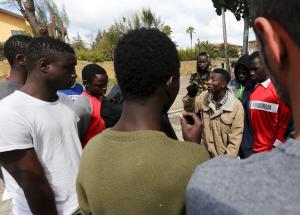
Adolescent migrants argue during a protest in a courtyard at an immigration centre in Caltagirone, S …
The number of minors traveling alone in this mass migration has soared -- underage arrivals to Italy tripled in 2014 from the previous year.
This poses a particular problem for frontier countries like Italy, Spain and Greece. Italy, by law, cannot repatriate minors and is required to provide healthcare and schooling.
Host countries are already under strain. In Italy, 13,000 teenagers -- mostly young men fleeing conflict, poverty or persecution -- now live in Italian immigration centers, alongside adult shelters that are bursting at the seams with some 80,000 people.
The numbers are expected to rise because of the world's demographic boom. There are more 10-to 24-year-olds now than at any other time in human history, mostly living in poor countries, according to the United Nations Population Fund.
"The Mediterranean will continue to be a heavily trafficked and deadly space," said Maurizio Albahari, professor at Notre Dame University in South Bend, Indiana, and author of a soon-to-be published book called "Crimes of Peace: Mediterranean Migrations and the World's Deadliest Border".
View gallery
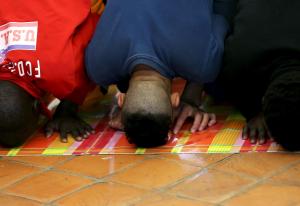
Adolescent migrants pray at an immigration centre in Caltagirone, Sicily, March 18, 2015. The number …
Facing this prospect, Italy is trying to introduce a long-term system for sheltering and integrating waves of future minors. It is tapping European Union funds to open up new shelters to be monitored by humanitarian groups that seek to help integrate the youngsters.
There is resistance. Some right-wing politicians, particularly in the wealthy north of Italy, are pushing back against opening shelters in their regions. Just this week, Lombardy and Veneto, northern regions that are governed by the anti-immigration Northern League, said they would not accept any new migrants.
ITALIAN SHELTERS
The rise in migrants in the Mediterranean this year is largely the result of political instability in Somalia and Eritrea and the recent breakdown of order in Libya, in addition to the civil war in Syria.
Financial concerns prompted Italy last year to halt a permanent search-and-rescue mission called Mare Nostrum. But coast guard and navy officials in southern Italy are still rescuing migrants daily lest they die in rough waters.
View gallery
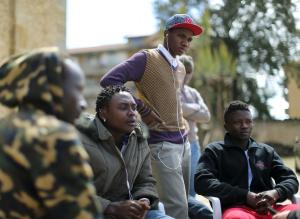
Adolescent migrants Mustafa (2nd R) from Gambia and, Ishmael (R) from Sierra Leone stand in a courty …
Italy separates unaccompanied minors from adults in its shelters. But many of the shelters for younger migrants have lacked in specialized personnel, including interpreters or Italian teachers. They have provided little more than a bed, a meal and some cheap clothes.
"The manner in which we took in more than 14,000 minors last year makes me ashamed to be an Italian," Mario Morcone, the chief administrator for immigration at the Interior Ministry, told a parliamentary committee last month.
Italy is trying to turn things around. In March, the state completed a 13-million-euro tender for 10 new "first shelter" centers, where a maximum of 50 minors are housed and given basic healthcare and language classes for up to 90 days. A tender for 10 more is underway.
After staying in the "first shelter", the minors are due to go to a "community" of 12 children where they enroll in school and participate in activities including soccer. Italian courts assign guardians to the children, who are legally required to stay in the communities until they are 18.
"We are building the future of our country because we have before us a mix of peoples who now live here, who want to live here, and who want to contribute," said Daniele Cutugno, a psychologist who runs the shelter where Bangura lives.
View gallery
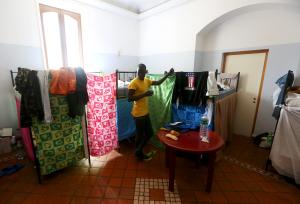
An adolescent migrant stands in his bedroom at an immigration centre in Caltagirone, Sicily, March 1 …
Domenico Manzione, undersecretary for immigration at the Interior Ministry, said new communities for some 1,000 minors should soon be set up, though he said more will be needed.
"There is no hiding the fact that we are facing a task that is far from simple because the number of arrivals is putting pressure on structures that are already strained," Manzione told Reuters.
BUILDING A FUTURE
The shelter where Bangura and 55 other African boys live is on the outskirts of Caltagirone, a city of fewer than 40,000 known for its ceramic industry. It is a refurbished, two-storey stone villa with sprawling grounds.
Most of the boys there did not plan to come to Italy, and each has his own tragic reason for seeking out a future far from home at an age when teenagers in the West are occupied with video games and driving lessons.
View gallery
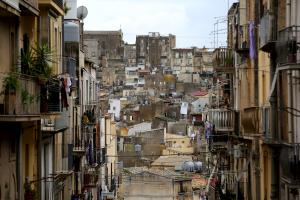
A view of Caltagirone in Sicily, March 18, 2015. The number of migrants reaching Italy by sea this y …
Abubacarr Dibba, 17, said he left Gambia when his father died and his family lost its land. Mustapha Kanteh, now 18, also left Gambia when his father died and a local chieftain beat him with a metal pipe and threatened to kill him.
Every young man said he had been beaten and imprisoned. Bangura said he still suffers headaches from being struck by a pistol handle in Libya.
Bangura said that when he reached Libya, he was kidnapped for two weeks, while his captor tried to extort a ransom from purported relatives. He was then sent to jail, before being put on a boat to Italy. Bangura said he now fasts, prays and waits.
"I didn't know anything about Italy before coming. Now I want to spend my life here. I'm here for help. Whatever the Italians do I'll be patient until they can help me."
(Reporting by Steve Scherer, Editing by Alessandra Galloni and Angus MacSwan)
Related video:
